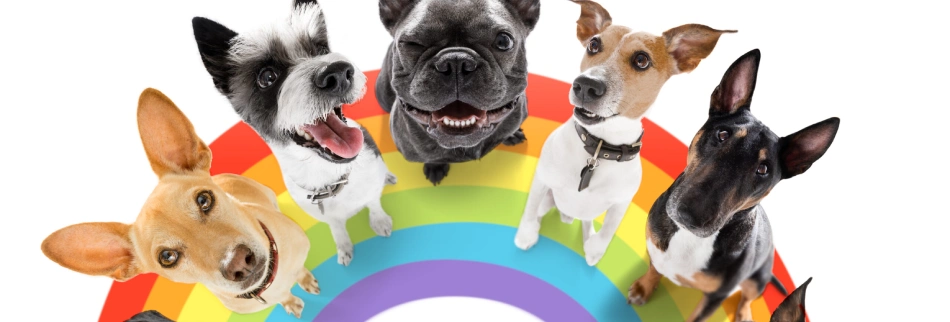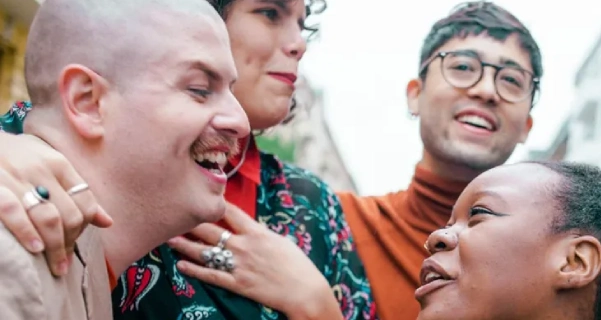
One of the many joys of pet ownership is observing the diverse and often amusing behaviors of our canine companions. From chasing their tails to demonstrating a penchant for particular toys or buddies at the dog park, dogs continually intrigue and surprise us with their antics. Yet, some behaviors can lead us to wonder how much our dogs' experiences mirror our own. One question that periodically pops up in this regard is: Can dogs be gay?
It's a fascinating inquiry that not only probes the boundaries of canine behavior but also reflects our broader curiosity about sexuality in the animal kingdom. Before we venture further, it's vital to acknowledge that, as humans, we tend to anthropomorphize animal behaviors, interpreting them based on our own experiences and emotions. This tendency can both enlighten and complicate our understanding of our pets.
However, armed with that awareness, we can dive into this topic and explore what science, observations, and expert opinions have to say about dogs and their sexual behaviors. So, fasten your leashes; it's time to take a walk through the landscape of canine behavior and sexuality!
Understanding Canine Behavior: What Does It Mean for a Dog to be 'Gay'?
First off, it's essential to understand that when we use the term 'gay' for dogs, it doesn't carry the same implications as it does for humans. Human sexuality is complex and closely tied with emotional and social interactions. For humans, being gay means being attracted to individuals of the same sex on a physical, emotional, and often romantic level.
On the other hand, dogs' sexual behaviors are primarily driven by reproductive instincts and dominance hierarchies. When dogs engage in what appear to be 'homosexual' behaviors, it's often more about exerting dominance, establishing social hierarchies, or simply expressing excitement and playfulness. Even mounting behaviors, which we might interpret as sexual, are often about social status rather than sexual desire.
However, while dogs don't exhibit 'gay' or 'straight' behaviors in the way humans do, it's also true that dogs don't limit their sexual behaviors to purely reproductive contexts. Dogs can and do engage in a range of sexual behaviors outside of mating, and these behaviors can involve dogs of the same sex.
While it's not entirely accurate to say that dogs can be 'gay' in the human sense, it's clear that dogs exhibit a range of sexual behaviors, and these don't strictly conform to male-female mating pairs. It's a reminder that nature is diverse and that our canine companions, like us, have complex social and behavioral lives.
Expert Opinions on Canine Homosexual Behavior
When it comes to the scientific perspective, most experts agree that what we interpret as 'gay' behavior in dogs is not about sexual orientation in the way we understand it in humans. Animal behaviorists and veterinarians emphasize that dogs, unlike humans, do not have sexual orientations. They behave in ways driven by instinct, reproductive needs, and social structures.
According to Dr. Bonnie Beaver, a professor at Texas A&M University's College of Veterinary Medicine and executive director of the American College of Veterinary Behaviorists, "Dogs are not gay or straight, they just are." She points out that attributing human sexual orientation labels to dogs is misleading and anthropomorphic. While dogs do engage in same-sex sexual behaviors, it's usually more about dominance and hierarchy than sexual orientation.
Meanwhile, other experts like Marc Bekoff, an evolutionary biologist, argue that while we shouldn't apply human labels to animals, it's also crucial not to dismiss the complexity and diversity of animal sexual behaviors. He states, "Animals have a sex life, and it's not just about reproduction. There are many animals that have what we might call non-reproductive sex, and they have it regularly."
While it's interesting to delve into this topic, it's crucial to remember that dogs don't adhere to the same sexual labels as humans. Their behaviors are complex and fascinating, yet distinctly different from ours.
Do Gay Dogs Exist? A Question of Perspective
Ultimately, the question of whether dogs can be "gay" depends on how we understand and interpret their behaviors. While dogs do engage in same-sex behaviors, it's crucial to remember that they aren't guided by human social constructs or labels. Instead, their actions are likely influenced by various factors like dominance, social hierarchy, play, and occasionally, reproductive behavior.
So, can dogs be gay? In the human sense of having a sexual orientation, most likely not. But do they engage in same-sex behaviors? Yes, they certainly can and do. It's a fascinating subject and one that reminds us of the complexity of the natural world.
Conclusion: Canine Behavior - A World Beyond Labels
Whether we're discussing our dogs' quirks, preferences, or behaviors, it's crucial to approach the subject with understanding and respect for their unique experiences as animals. Assigning human attributes or labels may seem appealing, but it could potentially lead us to misunderstand the intricate dynamics of canine behavior.
Ultimately, as dog owners, lovers, and observers, we should cherish the bond we share with these incredible creatures. By learning about and understanding their behaviors, we can deepen this connection and appreciate them for who they truly are - without the need for human labels or definitions. So, while your dog may not identify as 'gay' in the human sense, their behaviors and interactions remain a captivating part of their identity - and a testament to the diverse and fascinating world of canine behavior.







